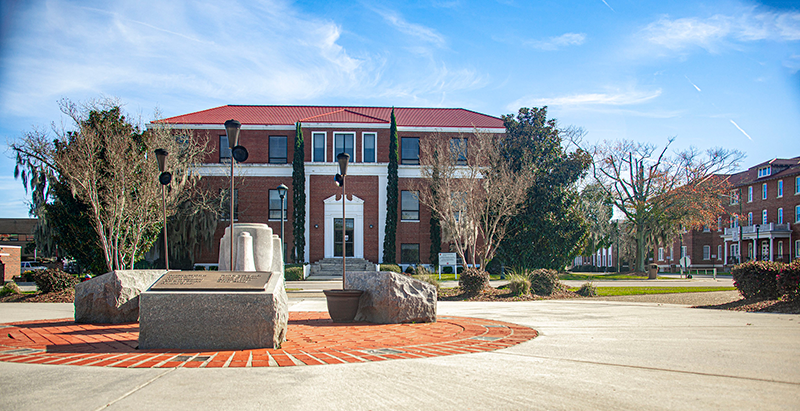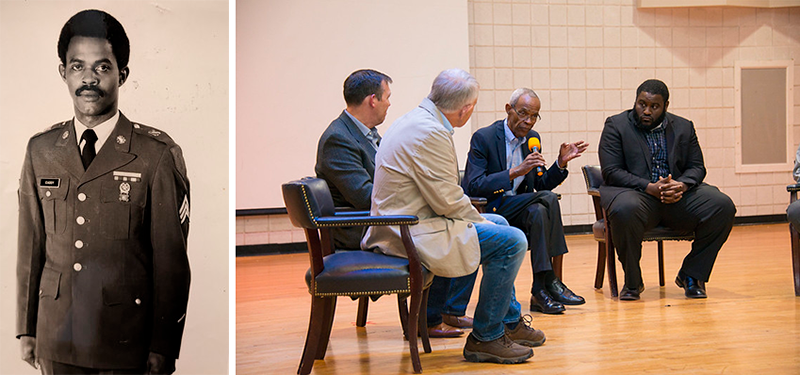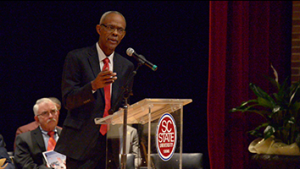Bobby Eaddy: In Memoriam
March 17, 1950 – October 15, 2022
Bobby Eaddy was born in Florence, South Carolina, on March 17, 1950. He was the youngest of Henry and Evaline Eaddy’s four children. As a 17-year-old college freshman, he was shot by law enforcement officers during the February 8, 1968, Orangeburg Massacre, which occurred during a student-led Civil Rights demonstration on the campus of South Carolina State College. He carried the nearly fatal bullet in his chest throughout his life as it stopped inches from his heart and could not be removed.
Samuel Ephesians Hammond, Jr. (age 18); Henry Ezekial Smith (age 19); and Delano Herman Middleton (age 17) were killed during the February 8, 1968, Orangeburg Massacre when law enforcement officers opened fire on the group of nearly 200 student demonstrators.
Approximately 27 others were physically injured—including Bobby. Louise Kelly Cawley (age 27) was beaten by officers and lost her unborn child a week later.
The Orangeburg Massacre occurred two nights after efforts to integrate the All-Star Bowling Lane—the city’s only bowling alley—erupted in violence, sending nine students and one city policeman to the hospital. On the night of February 8, 1968, students lit a bonfire in front of campus and state troopers arrived with the fire department to douse the flames. During the tense standoff, officers positioned themselves on the edge of campus and began firing at the students.
Each year since the Orangeburg Massacre, the now South Carolina State University has held a ceremony to honor those involved. Markers on the campus now commemorate the victims of the shootings and identify the location where the tragedy occurred. The university is the only public Historically Black College/University (HBCU) in the state.

Related Campus Shootings
The incident, which became known as the Orangeburg Massacre, was the first of its kind on any U.S. college campus, happening two years before the similar May 4, 1970, Kent State shootings; the May 15, 1970, Jackson State shootings; and the Nov. 16, 1972, shooting at Southern.
Four students were killed by law enforcement and nine injured at the Kent State demonstration against the Vietnam War.
Phillip Lafayette Gibbs (age 21, a junior) and James Earl Green (age 17, a senior at nearby Jim Hill High School) were killed by law enforcement and twelve others were wounded at Jackson State. Jackson State is one of the nation’s more than 100 HBCUs.
Students Denver Smith and Leonard Brown were killed by law enforcement at Southern, which is also an HBCU.
Family and Personal Life
Patsy Gilbert Eaddy, Bobby’s future wife of 52 years, was on the SC State campus at the time of the tragedy. She became the mother of the couple’s three children, Andre, Derran, and Latisha, and went on to have a full career as a National Board Certified Teacher at the 4th and 5th grade levels.
From his early years, Bobby’s leadership qualities, endearing personality, and talents were applied in academics, choir, basketball, and football. He graduated from Gibbs High School in Pamplico, SC, where he served as the 1967 class president.
While attending SC State, Bobby proudly played football and studied physical education with the aspiration of becoming a coach. He was also the lead singer of the Soul Agents band.
Injustices of the Court
The February 8 campus shooting changed Bobby’s life and the entire university community indefinitely. The case prompted an FBI investigation. Nine officers were eventually charged with misdemeanors, and Bobby, having been shot, was the first of 14 students to testify. The jury of 10 whites and two blacks acquitted the officers in less than two hours. In a subsequent trial, the officers were absolved of civil liability and the victims’ families were denied restitution.
African American activist Cleveland Sellers, an officer of the Student Nonviolent Coordinating Committee, was convicted of inciting to riot, and was the only person to serve jail time in connection with the Orangeburg Massacre. He served seven months of his one-year sentence; however, 23 years later in 1993, he was pardoned. His son Bakari Sellers was elected to the SC Legislature and is a CNN television analyst.
Military Service and Career
Bobby left the university in the wake of the shooting and enlisted for eight years of decorated service in the U.S. Army during the Vietnam War era. He received the National Defense Service Medal, the Army Commendation Medal, Expert Rifleman Medal, and other recognitions. He was stationed in Germany; Ft. Benning, GA; and Ft. Hood, TX.
While serving in Germany, Bobby became a member of the Clarence Kimbrough Lodge of Masonic Order. He was also a longtime member of the National Association for the Advancement of Colored People.
His career focused on sales and management after the military. He earned certifications in real estate and business from City Colleges of Chicago.
In addition, Bobby was continuously active in his community. He was a charter deacon and trustee at Greater Peace Missionary Baptist Church in Killeen (Fort Hood), TX, and served as a deacon at Rehoboth Baptist Church in Columbia, SC. He sang in the church sanctuary choirs and further enriched his life through gardening and yard work, building model cars, and mentoring youth.

Public Speaking and Media Engagement
Bobby later reconnected with the SC State University through the Alumni Association. He attended football games and other events, and was the keynote speaker at the school’s 47th Orangeburg Massacre Commemoration Ceremony.
Bobby was an award-winning public speaker who gave lectures, as well as regional and national media interviews about the February 8, 1968, demonstration. He is included in “The Orangeburg Massacre” book by Jack Bass and Jack Nelson. Bobby was also interviewed for the 2019 National Football League documentary, “Orangeburg: A Team, A Town, An American Tragedy,” which was produced by Jim Fabio. He was shown wearing jersey number 21 in the football team photo that was included in the 2023 ESPN “Outside the Lines” documentary about February 8.
Bobby was interviewed by media outlets, such as the Charlotte Observer, Times and Democrat, WCSC Live 5, ABC News 4 WCIV, and ABC News 25 WOLO. In addition to speaking at SC State several times, he was a guest speaker at the University of South Carolina in 2022.
October 15, 2022, Passing of Bobby Eaddy
Bobby passed peacefully surrounded by family on Oct. 15, 2022, at the age of 72.
The university posthumously honored Bobby with the Smith Hammond Middleton Social Justice Award on February 8, 2023, during the 55th Commemoration Ceremony of the shooting. He was also posthumously granted his Bachelor of Science degree in Physical Education on December 16 during the 2022 Fall Commencement Convocation.
In 2025, during the 57th commemoration of the Orangeburg Massacre, the International African American Museum in Charleston, recognized Bobby’s inspiring story in their South Carolina Collections gallery. The museum’s location at Gadsden’s Wharf memorializes where 40 percent of African slaves were forcibly brought into the United States throughout the 400 year-long transatlantic slave trade.
Bobby is survived by his wife, Patsy, whom he married on Valentine’s Day in 1970. He is also survived by the couple’s two sons and one daughter—Andre, Derran, and Latisha. He was preceded in death by his brothers and sisters Henry, Jr.; Lucius (Billy); and Corrine. In addition, Bobby is survived by his mother-in-law Eunice D. Gilbert.
As a beloved member of his community, Bobby will always be remembered by the large family, church, military, and university communities that he lovingly cultivated throughout his life.
Government Oversight of the Orangeburg Massacre
In 2001, SC Governor Jim Hodges spoke on behalf of the state and expressed deep regret for the events of February 8, 1968. In 2003, SC Governor Mark Sanford issued an apology.
In 2002 and 2007, state legislation was introduced to create a formal commission tasked with making victims’ compensation recommendations; however, the proposal was not signed into law and the commission was not convened.
The US Federal Bureau of Investigation cited double jeopardy protections in 2007 when declining to reopen the case along with other unresolved civil rights matters.
The Civil Rights Cold Case Records Collection Act of 2018 was signed into US Federal law, authorizing the establishment of a records review board. The Civil Rights Cold Case Records Review Board is tasked with overseeing the release of records involving the killing of African Americans in the US from 1940 to 1979.
The review board has been given the “power to declassify government files and subpoena new testimony in the hopes of reopening cases or revealing publicly why many were never fully investigated. The Orangeburg Massacre is among the cases included under this authority.
For additional information on Bobby Eaddy:
- ABC News 4: IAAM Recognizes Bobby Eaddy
- Int’ African American Museum: Recognizes Bobby Eaddy
- SC State University: 2023 Social Justice Award
- Post and Courier: 2023 Social Justice Award
- CBS News 19 WLTX: 2023 Social Justice Award
- CBS 12 WRDW & NBC 26 WAGT: 2023 Social Justice Award
- NBC News 10 WIS TV: Memoriam
- ABC News 25 WOLO: Memoriam
- ABC News 15 WCIV: Memoriam
- CBS News 19 WLTX: Memoriam
- Fox News 57 WACH: Memoriam
- Fox News 57 WACH: Memoriam
- Live 5 WCSC: Memoriam
- Times and Democrat: Memoriam
- Times and Democrat: Posthumous Bachelors Degree
- Times and Democrat: Posthumous Bachelors Degree
- NFL Network: Orangeburg: A Team, A Town, An American Tragedy
- SC State University: SC State to hold commemorative Orangeburg Massacre events
- Caflin University: Orangeburg: A Team, A Town, An American Tragedy
- Charlotte Observer: 50 years after 3 students died in SC civil rights protest, survivors still ask ‘Why?’
- Live 5 WCSC: Victims of Orangeburg Massacre vow never to forget, 43 years later
- Times and Democrat: Remembering Feb. 8, 1968
- ABC News 4: SC State honors three killed in Orangeburg Massacre
- ABC Columbia: Remembering the Orangeburg Massacre 50 Years Later
- The Daily KOs: Orangeburg, SC, 1968: The massacre of students you may not have heard of
For additional information on the Feb. 8, 1968 demonstration:
- Smithsonian Magazine
- History Channel
- Business Insider
- CNN News
- Wikipedia
- National Public Radio
- Public Broadcast Service
- NFL Network
- ESPN Podcast
- ESPN Outside the Lines
Media Photo for Download: Bobby Eaddy speaking in 2015 at the 47th Orangeburg Massacre commemoration ceremony held on the campus of South Carolina State University.


